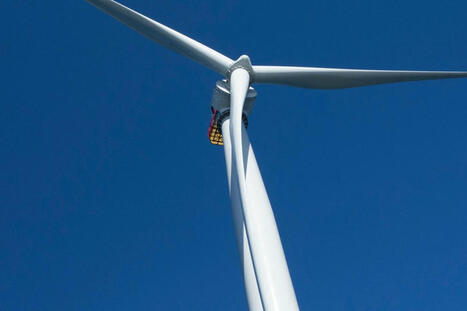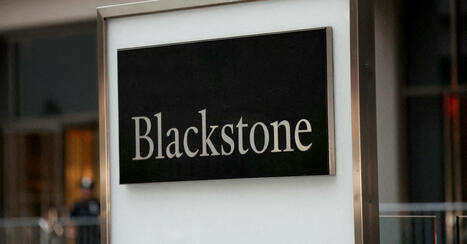 Your new post is loading...
U.S. Federal Reserve Chair Jerome Powell’s speech to the annual Jackson Hole economic conference on Friday comes amid unprecedented pressure on the central bank from U.S. President Donald Trump, but mixed economic data may pull Powell toward a middle ground that leaves major questions unresolved. Investors are expecting and Trump is demanding a rate cut when the Fed meets next month, and two Fed governors began pushing for cuts with dissents at the central bank’s last policy meeting on concerns the labor market may be weakening faster than headline employment data suggests. But inflation remains above the Fed’s two per cent target and is expected to move higher as the cost of Trump’s import tariffs works its way into retail prices, a reason for caution in lowering rates during a price-adjustment process some policymakers feel may last into next year.
The Trump administration is considering taking equity stakes in companies receiving funds from the 2022 Chips Act but has no plans to seek shares in bigger semiconductor firms that are increasing their U.S. investments, according to a government official. Commerce Secretary Howard Lutnick confirmed in a Tuesday interview with CNBC that the government is in talks to take a 10% equity stake in the troubled semiconductor company Intel and said the administration may consider equity stakes in other firms as well. The comments fueled worries among industry executives that the government might also take equity stakes in large chip makers like Taiwan Semiconductor Manufacturing, Micron Technology and Samsung. Last month, the administration took a 15% stake in a producer of rare-earth materials.
Canadian oil and gas producer Cenovus Energy said on Friday it will buy MEG Energy in a cash-and-stock deal valued at $7.9-billion, including debt, to create one of the largest oil sands companies in Canada. The two companies, which will combine MEG’s Christina Lake oil sands operations in Alberta with Cenovus’ neighboring assets, will have a combined oil sands production of over 720,000 barrels per day. MEG Energy in June rejected a hostile takeover offer from Strathcona Resources, calling the bid inadequate and not in the best interest of its shareholders, and launched a strategic review to explore better alternatives. James McFarland, chairman of MEG Energy, said on Friday its board and a special committee have “concluded that the proposed transaction with Cenovus represents the best strategic alternative” after considering Strathcona’s unsolicited offer and engaging with multiple parties.
Le contrôleur nommé par le tribunal pour superviser la procédure de protection contre les créanciers de La Baie d’Hudson s’oppose à ce que les propriétaires soient contraints d’accepter le projet d’une milliardaire britanno-colombienne d’acheter plus d’une vingtaine de baux du détaillant. Dans un nouveau document déposé mercredi soir, Alvarez & Marsal a indiqué qu’il n’était pas d’accord avec l’idée que les propriétaires soient obligés d’accepter Ruby Liu comme locataire, même s’il soutient le processus de vente qui a abouti à son choix d’acheter 28 baux de La Baie. Plus tôt cette année, Mme Liu a acquis trois baux de La Baie dans des centres commerciaux britanno-colombiens dont elle est propriétaire pour 6 millions, mais son accord d’achat des 25 autres pour 69,1 millions s’est heurté à l’opposition de l’un des plus importants prêteurs du détaillant et de la plupart de ses propriétaires.
Deux des familles les plus riches du Canada semblent prêtes à se disputer l’un des documents les plus célèbres du pays. Une société de portefeuille appartenant à David Thomson souhaite acquérir la charte royale ayant donné naissance au détaillant La Baie d’Hudson pour au moins 15 millions et en faire don aux Archives du Manitoba, selon de nouveaux documents judiciaires. La demande de M. Thomson pourrait constituer un obstacle pour le grand magasin, qui doit demander au tribunal l’autorisation de vendre la charte pour 12,5 millions à Wittington Investments le 9 septembre prochain. La société de portefeuille appartenant à la famille Weston, surtout connue pour son conglomérat d’épicerie Loblaw, souhaite faire don de la charte au Musée canadien de l’histoire à Gatineau, en Outaouais.
Le gouvernement de Donald Trump, président climatosceptique et farouche détracteur des éoliennes, a lancé une enquête sur les importations aux États-Unis des composants de cette énergie renouvelable, ne fermant pas la porte à l’imposition éventuelle de droits de douane. Initiée le 13 août 2025 par le secrétaire au Commerce, mais rendue publique jeudi, cette procédure est menée dans le cadre de la section 232, qui permet au gouvernement américain de protéger un secteur d’activité par des droits de douane s’il estime qu’il y a risque pour la sécurité nationale. Sont concernées, les « importations d’éoliennes [ainsi que] leurs pièces et composants », précise ce document. Durant cette procédure, l’administration va chercher à obtenir plus d’information sur la production d’éoliennes aux États-Unis, la concentration des importations venues d’un « petit nombre de fournisseurs ou de pays étrangers et les risques associés ».
Saskatchewan Premier Scott Moe says he intends to travel to the People’s Republic of China – with the mission of helping the federal government negotiate an end to the tariffs against Canadian canola. “We’re going to go to China. We’re hopeful that the federal government will have representation alongside of us, and we’re hopeful that we’ll be able to support them and putting an end to some of these trade tariffs that we see,” he told reporters Wednesday. Moe will meet with officials from Ottawa and canola industry leaders in Saskatoon on Thursday. Those in attendance will include the federal agriculture minister and parliamentary secretary for the prime minister. Moe says that he has opened discussions with the federal government about the trip. He went on to say he believes Saskatchewan is in a unique position to assist negotiations – given its trade office in China has been operating for a decade.
Brazilian state-run oil firm Petrobras said on Wednesday that chairman Pietro Mendes has resigned from the role, as well as from his seat on the board of directors. Mendes is set to become a director at Brazil's oil and gas regulator ANP, after the Senate approved his nomination earlier this week. In a securities filing, Petrobras noted that under its bylaws, the board can elect a new chairman to serve until the next shareholders' meeting.
Private investment firm Gryphon Investors said on Thursday it had agreed to sell Shermco, its portfolio company, to Blackstone in a deal valued at about $1.6 billion. Irving, Texas-based Shermco provides comprehensive electrical system services, as well as critical services for data centers, utilities and other diversified commercial and industrial end-markets. It has operations in more than 40 locations in the United States and Canada. Growing global investments in artificial intelligence and modern data centers have fueled demand for maintenance and repair services, benefiting companies like Shermco. "We look forward to pursuing organic initiatives and making additional add-on acquisitions in partnership with Blackstone," Shermco CEO Phil Petrocelli said.
Gryphon said it had made its initial investment in Shermco in June 2018. Harris Williams served as the lead financial advisers to Shermco and Kirkland & Ellis as legal advisers to Gryphon.
(MDBI.MI), opens new tab shareholders on Thursday rejected a plan to buy Banca Generali, dealing a blow to the Italian merchant bank's attempts to thwart a hostile takeover by Monte dei Paschi di Siena (MPS). The bid battles are among a series of transactions which have been reshaping Italy's banking landscape as companies look for scale. Mediobanca had pitched the Banca Generali plan, which would have created Italy's second-largest wealth manager, as an alternative to the MPS transaction. The higher share price multiples at which wealth managers such as Banca Generali trade could have also lifted Mediobanca's valuation. Opposition to the plan was led by Mediobanca's two main investors, Italy's billionaire Del Vecchio and Caltagirone families, who together hold nearly 30% of its capital, and have long been at loggerheads with CEO Alberto Nagel. The families are also leading private shareholders in MPS and back its hostile bid for Mediobanca.
Police officers arrested 18 people at worker-led protests at Microsoft headquarters Wednesday as the tech company promises an “urgent” review of the Israeli military’s use of its technology during the ongoing war in Gaza. Two consecutive days of protest at the Microsoft campus in Redmond, Washington called for the tech giant to immediately cut its business ties with Israel. But unlike Tuesday, when the protesters occupying a plaza between office buildings left after Microsoft asked them to leave, the protesters on Wednesday “resisted and became aggressive” after the company told police they were trespassing, according to the Redmond Police Department. The protesters also splattered red paint resembling the color of blood over a landmark sign that bears the company logo and spells Microsoft in big gray letters. “We said, ‘Please leave or you will be arrested,’ and they chose not to leave so they were detained,” said police spokesperson Jill Green.
Après deux années de sécheresse qui l’ont forcée à réduire ses exportations, Hydro-Québec constate que ses réserves d’eau sont actuellement au niveau le plus bas jamais enregistré. L’eau emmagasinée dans ses 28 réservoirs équivalait en mai dernier à la production de 50,3 térawattheures (TWh) d’électricité, selon le plus récent rapport sur l’état des réserves d’Hydro-Québec. C’est presque moitié moins que les 97 TWh en réserve l’an dernier, ce qui était considéré comme très bas. Les grands réservoirs d’Hydro-Québec peuvent contenir l’équivalent de la production de 178 TWh d’électricité, soit une année complète de consommation au Québec. Les 50,3 TWh représentent donc moins du tiers de cette capacité. Un térawattheure représente un milliard de kilowattheures. Le niveau très bas des réserves force la société d’État à importer massivement de l’électricité des réseaux voisins pour laisser ses réservoirs se remplir.
Les voitures et produits pharmaceutiques européens seront taxés à 15 % à leur entrée aux États-Unis, selon un communiqué commun publié jeudi par l’UE et l’administration Trump qui ne prévoit aucune exemption pour les vins et spiritueux. « Malheureusement, nous n’avons pas réussi à ce que ce secteur » soit inclus dans les exemptions, a déclaré le commissaire européen Maroš Šefčovič lors d’une conférence de presse en présentant les détails de l’accord commercial noué entre l’UE et l’administration Trump fin juillet. Il a ajouté que les discussions se poursuivraient et que « ces portes n’étaient pas fermées pour toujours ». Cette exemption aux droits de douane de 15 % pour les vins et spiritueux était vivement réclamée en particulier en France et en Italie. Après des mois de négociations très âpres, Bruxelles et Washington ont scellé fin juillet un accord commercial basé sur des droits de douane de 15 % sur les produits européens qui arrivent aux États-Unis.
|
Beijing and Washington are discussing a trade deal that could include fresh orders totaling hundreds of Boeing jets, people familiar with the matter said. The purchase is envisioned as a component of a more expansive trade deal if the world’s two largest economies can reach an agreement in the next few months, they said. The purchase discussions were earlier reported by Bloomberg News, which said China could buy as many as 500 jets from the American plane maker. U.S. passenger-jet orders are becoming a favored concession for countries looking to improve tariff terms from American authorities. Qatar’s state-owned airline in May agreed to buy up to 210 wide-body 787 and 777X jets from Boeing as part of a broader bilateral agreement. Announced trade deals with the U.K., Japan and Indonesia have also tacked on pledges to buy a certain number of the American airplanes.
Wealth One Bank of Canada has parted ways with its chief executive, Paul Leonard, shortly after new owners acquired the Toronto-based financial institution that was subject to a federal government divestiture order. John Webster, a long-time financial services executive who became Wealth One’s chairman last month, has stepped in as interim CEO, Globalive Corp. said in a statement provided to The Globe Thursday. “Wealth One remains committed to serving its customers and partners and maintaining the strength and stability of our operations. A search for a permanent CEO is under way and the bank thanks Paul Leonard for his efforts over the past seven years,” the statement said. Mr. Webster has worked in financial services for decades and has held leadership roles at the Bank of Nova Scotia and served as president and CEO of Scotia Mortgage Authority, Globalive said.
Co-operation among large investors, industry leaders and governments is rapidly increasing as parties discuss how to get major projects off the ground to protect Canada against the threat from tariffs, the CEO of the OMERS pension fund says. Demand for new infrastructure, energy and defence investment is surging, and so is investors’ willingness to explore big-ticket investments in projects of national importance, Blake Hutcheson, chief executive officer of Ontario Municipal Employees Retirement System, said in an interview. OMERS earned a 2.2-per-cent return in the first half of 2025, adding $3.1-billion to its assets in spite of a tough start to the year for markets, according to a mid-year update released Thursday. With high volatility in public markets and sluggish dealmaking for public assets, Canadian pension funds are eyeing a growing opportunity to make new investments at home.
La décision des États-Unis d’assujettir des centaines de catégories de produits supplémentaires aux droits de douane de 50 % sur l’acier et l’aluminium suscite des inquiétudes croissantes. L’ajout de 407 catégories, allant des bulldozers aux meubles, est entré en vigueur plus tôt cette semaine, accentuant la pression et les coûts pour ceux qui souhaitent vendre sur le marché américain. « Cette mesure porte un nouveau coup à l’économie intégrée que nos deux pays ont bâtie au cours des dernières décennies », a déclaré Catherine Cobden, directrice de l’Association canadienne des producteurs d’acier, dans un communiqué publié jeudi. Elle a ajouté que l’industrie était « consternée » par cette décision, qui touchera également des produits comme les couverts, les réservoirs de propane, les climatiseurs et l’équipement agricole, notamment les tracteurs.
La Société des alcools du Québec (SAQ) pourrait être contrainte de détruire l’équivalent de 300 000 $ en alcool américain, banni de ses tablettes. La société d’État a confirmé que les coûts envisagés sont « de l’ordre de » 300 000 $, comme l’a rapporté Radio-Canada, plus tôt jeudi. Les produits américains sont retirés des tablettes de la SAQ depuis le 4 mars, en riposte aux droits de douane imposés par le président américain, Donald Trump. Les alcools américains achetés avant le boycottage sont entreposés, pour le moment, mais la SAQ n’aura pas le choix de les détruire lorsqu’ils dépasseront leur date de péremption, à moins que Québec change ses directives. Pour le moment, cette valeur estimée ne représente qu’une petite partie des 27 millions des produits américains entreposés. « Les produits concernés à l’heure actuelle sont principalement des vins rosés, des viniers, des prêts-à-boire, des crèmes, certaines bières et des liqueurs qui ne sont pas conçus pour une garde prolongée », a précisé la porte-parole Laurianne Tardif, dans une déclaration écrite.
Active Ownership, a major shareholder in Gerresheimer, said on Thursday it saw major potential for value creation at the German packaging and medical equipment specialist and called for a strategic review, a second activist investor to do so. "Active Ownership expressly welcomes the planned sale process for the moulded glass division and calls for a swift settlement in order to strengthen Gerresheimer's cash flow and reduce debt," Active Ownership said in a statement to Reuters. Gerresheimer, which had been undertaking a "strategic review" of the unit since 2024, announced plans to sell the moulded glass business earlier in August. It has been engaged in "constructive dialogue" with Active Ownership, as well as its other investors, for several months now, a company spokesperson told Reuters. Active Ownership said that further key measures should include additional portfolio optimization and the implementation of an efficiency programme, particularly through cost reductions in administration and business units.
Le syndicat fédéral représentant les travailleurs de l’Agence du revenu du Canada (ARC) a lancé une campagne en ligne dénonçant les compressions du personnel. Marc Brière, président national du Syndicat des employé-e-s de l’Impôt (SEI), a déclaré que la perte d’environ 3300 employés des centres d’appels au cours de la dernière année a entraîné des retards, de longs temps d’attente et des interruptions d’appels. Il a affirmé qu’une grande partie des appels restent sans réponse à l’ARC en raison du manque de personnel, d’où le nom de la campagne « Canada en attente ». « La dernière vague de compressions a eu lieu en mai dernier ; 1300 membres ont été mis à pied et l’impact a été absolument terrible sur les lignes et sur le service à la population, a déploré M. Brière. Parallèlement, cela a également eu des répercussions sur les employés. »
Investors panned Target's choice of insider Michael Fiddelke as CEO on Wednesday, viewing the 20-year company veteran as unlikely to fix the retailer's myriad issues that have resulted in years of stock-market underperformance. Fiddelke, 49, won't start until February of next year, when he replaces current CEO Brian Cornell, who has been expected to retire. In his first media call as incoming CEO, Fiddelke said his "number one goal is to get us back to growth." But investors see that as a tall order and balked at the news of Fiddelke's promotion. Shares dropped more than 6% on Wednesday even as quarterly same-store sales declined less than anticipated and overall revenue came in ahead of expectations. Analysts said Target could have looked outside for new leadership after years of sales struggles, merchandise missteps and inventory management problems. The company's operating margin dipped in its most recent quarter as well, and outgoing CEO Cornell said it will face challenges due to tariffs.
Le ministère de l’Éducation et Hydro-Québec annoncent un investissement de 250 millions dans la formation des travailleurs nécessaires à la transition énergétique. Ce partenariat « jamais vu » permettra de former plus de 5000 élèves supplémentaires dans les prochaines années, ont indiqué les deux organisations dans un communiqué diffusé jeudi. Le Québec cherche à former de la main-d’œuvre qualifiée pour la réalisation des grands chantiers énergétiques. Hydro-Québec investira 100 millions, et le ministère de l’Éducation 150 millions pour permettre aux centres de formation professionnelle d’accueillir plus d’élèves, acquérir de l’équipement et moderniser leurs installations. Les métiers que le ministère considère comme prioritaires en construction sont : charpentier-menuisier, arpenteur, grutier et mécanicien de machinerie lourde. Un soutien concret est également prévu pour permettre aux Premières Nations et aux Inuit de participer pleinement, s’ils le souhaitent, aux grands projets liés à la transition énergétique.
China has been expanding use of digital currencies as it promotes wider use of its yuan, or renminbi, to reflect its status as the world’s second-largest economy and challenge the overwhelming sway of the U.S. dollar in international trade and finance. However, restrictions on access to Chinese financial markets and limits on convertibility of the yuan, or “people’s money,” are big obstacles blocking its global use. Still, Hong Kong already has stablecoin regulations and some Chinese experts are pushing for regulations to prepare for a possible stablecoin pegged to the yuan. Officials at the People’s Bank of China and State Council Information Office in Beijing did not immediately respond to requests for comment on a Reuters report that the State Council, or Cabinet, is preparing to issue a plan for internationalizing the yuan that might include a yuan stablecoin.
HR software provider Dayforce said on Thursday buyout firm Thoma Bravo will take it private in a $12.3 billion deal, including debt. The offer represents a premium of 32.4% based on the stock’s closing price on August 15, when news of the deal talks was first reported. Under the terms of the deal, Dayforce shareholders will receive $70 per share in cash, representing an equity value of $11.18 billion, according to Reuters calculations. The software sector has emerged as an investment target due to resilient subscription services and recurring revenue in an economy weighed down by a deteriorating labour market, trade tariffs and erratic spending. Dayforce, which rebranded from Ceridian HCM Holding last year, faces strong competition in the industry, with enterprises preferring more established companies with larger operations.
Le constructeur de voitures de luxe Porsche prévoit de licencier la majorité des employés de sa filiale de batteries Cellforce, a appris jeudi l’AFP de source syndicale, un nouveau revers dans le virage électrique de ce fleuron du groupe Volkswagen en crise. Porsche souhaite limoger 200 des 286 employés de l’unique site de Cellforce, à Kirchentellinsfurt (Sud-Ouest), a indiqué Kai Lamparter à l’AFP, représentant local du syndicat IG Metall, confirmant une information de l’hebdomadaire Spiegel paru la veille. M. Lamparter assure avoir été informé d’une annonce de licenciement collectif déposée auprès de l’agence pour l’emploi de Reutlingen. Propriétaire à 100 % de cette filiale créée en 2021, Porsche n’a toutefois pas confirmé l’information du Spiegel.
|




 Your new post is loading...
Your new post is loading...






























